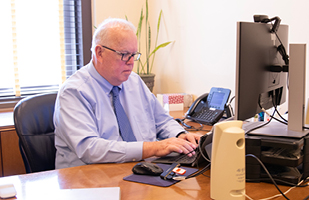Leader’s Forward Thinking Helps Courts Evolve

Milt Nuzum is retiring from the Supreme Court and returning to Washington County to help people dealing with substance use issues.

Milt Nuzum is retiring from the Supreme Court and returning to Washington County to help people dealing with substance use issues.
When William “Milt” Nuzum first became a judge in Marietta in the 1990s, he leaned on more experienced judges to share their knowledge with him. Nuzum realized the importance of judges sharing information to advance the judiciary and made it a hallmark of his more than 40-year legal career.
Nuzum announced his retirement this month from the Supreme Court of Ohio where he has served as director of judicial and education services.
“There are always opportunities for improvement. It comes down to identifying an issue, listing the rewards and obstacles, and figuring out ways to manage the challenges,” he said.
While on the Marietta Municipal Court bench, Nuzum created one of southeast Ohio’s first drug courts to deal with the growing issue of addiction, and he saw the internet as a means of giving citizens access to court information. He learned from his son how to write code and created one of the first local court websites in the country.
“It taught other judges about the benefits of having it as a resource to their communities,” Nuzum said.
Nuzum began his private legal practice in Marietta in 1982 and was appointed municipal judge in 1993. When he was new to the bench, he learned from seasoned judges and when he gained more experience, he began to mentor others. His commitment to judicial education and improving court operations put him in position to be a state leader after 13 years on the bench.
Changing World
Nuzum started with the Supreme Court in 2007, overseeing the development of continuing legal education for judges and court personnel as the Judicial College director. He advanced from that position into larger roles with the Court, pushing for more courses that examine the wide range of topics impacting the judiciary and how to make best practices from that information more accessible to more people through technology.
Using the internet to provide education to judges and court staff changed an operation limited to in-person courses and seminars into a system that people could attend programs anywhere using their computers and mobile devices. The development of an online platform included recordings of webinars and other content, so judges and others could learn about issues important to their courts on their time.
“I’m proud of the advancements that we’ve made both with quality and the ability to offer many options to judges, court personnel, and guardians, while utilizing more tools that are convenient for them,” said Nuzum.
Equipping courts with information and options on how to operate proved invaluable three years ago during the COVID-19 pandemic. The system and technology that expanded the Supreme Court’s educational reach and services also allowed the Court to continue operations. Oral arguments, the Ohio Bar Exam, and the bar admissions ceremony seamlessly transitioned online. Those proceedings were examples for Ohio courts on how judges and staff could conduct business during unprecedented circumstances.
“We’ve always been fortunate at the Court to have the resources and support when there’s something that needs to be explored. It also helps when you work with highly skilled and intelligent people,” said Nuzum.
Back to His Roots
After 16 years with the Court and four decades as an attorney, Nuzum isn’t slowing down. In addition to some travel, he’s returning to his native Washington County for a cause he championed when he was a judge – helping those with substance use issues.
During the early years of the opioid crisis in 2000, only a few drug courts existed in the state when then-Judge Nuzum considered creating one. Nuzum received guidance from other judges and built a program based on providing treatment, education, and job training that proved successful. Today, more than 200 specialized dockets are certified by the Supreme Court.
Nuzum will take what he has learned about drug courts and apply that knowledge in his new role as general counsel for a women’s treatment program. He knows how beneficial it can be when people come together as stakeholders to share ideas and information.
“We’re there to help each other so it can really make a difference in people's lives,” said Nuzum.

